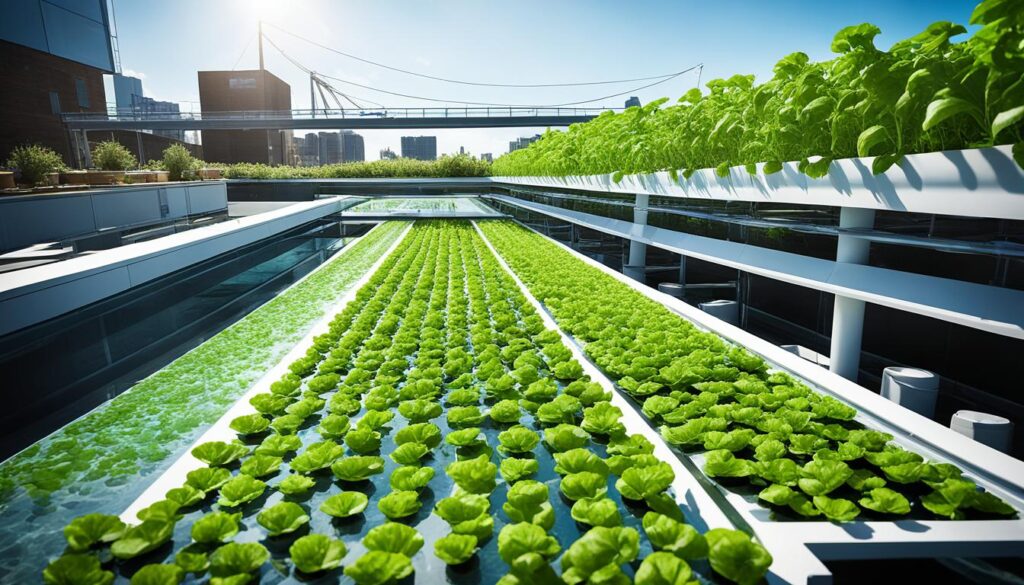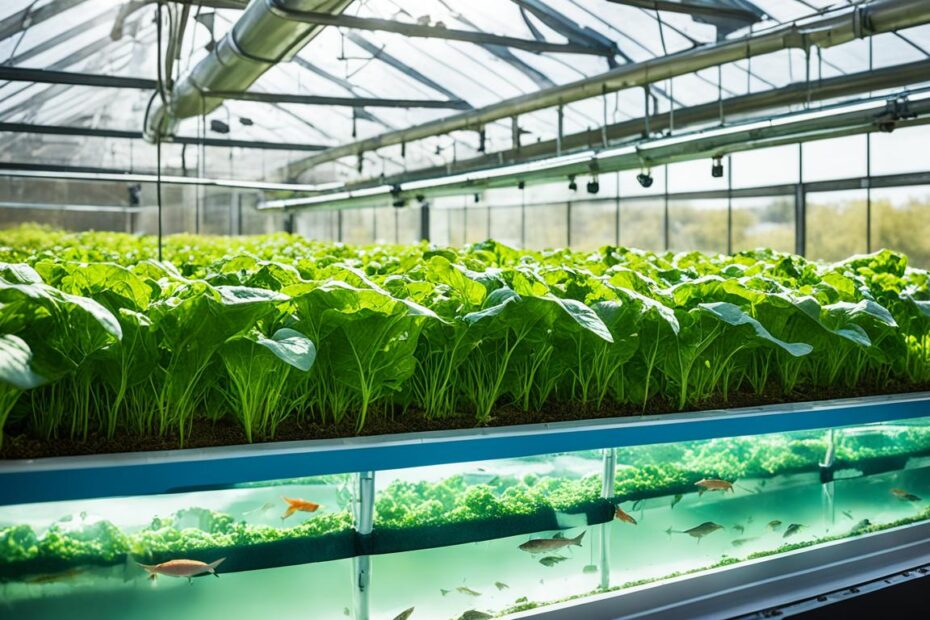In the pursuit of sustainable agriculture and environmental stewardship, innovative solutions are emerging that challenge traditional farming methods.
One such revolutionary approach is the integration of aquaponics systems that leverage the valuable resource of equine wastewater.
This article explores how this unique integration can revolutionize modern food production, addressing the growing demand for eco-friendly and resource-efficient farming practices.
Key Takeaways
- Aquaponics systems combine fish farming and hydroponic plant cultivation, creating a symbiotic, closed-loop ecosystem.
- Utilizing equine wastewater as a nutrient-rich input for aquaponics systems promotes sustainable agriculture and waste recycling.
- Aquaponics systems using equine wastewater reduce environmental impact by conserving water and producing organic, eco-friendly fertilizers.
- This approach supports a circular economy by maximizing resource utilization and creating a self-sustaining farming model.
- Aquaponics systems can be adapted for urban farming, enabling local food production and improving access to fresh, nutritious produce.
What is Aquaponics?
Aquaponics is an innovative system that combines aquaculture (fish farming) and hydroponics (soil-less plant cultivation) into a symbiotic relationship.
This integrated approach allows for the sustainable production of fish and plants, creating a closed-loop ecosystem that maximizes resource utilization and minimizes waste.
Understanding the Symbiotic Relationship
In an aquaponics system, the waste produced by the fish is converted into nutrients that are then used to fertilize the plants.
The plants, in turn, help to purify the water, creating a natural, self-sustaining cycle. This symbiotic relationship between the fish and plants is the foundation of aquaponics, enabling efficient and environmentally-friendly food production.
Benefits of Aquaponics Systems
- Increased Productivity: Aquaponics systems can produce both fish and high-quality vegetables or herbs simultaneously, maximizing the use of available resources.
- Water Conservation: The recirculating nature of the system reduces water usage by up to 90% compared to traditional farming methods.
- Reduced Environmental Impact: By eliminating the need for chemical fertilizers and pesticides, aquaponics minimizes the environmental footprint of food production.
- Year-Round Growing: Aquaponics systems can operate indoors or in controlled environments, allowing for continuous, year-round production.
- Efficient Resource Utilization: The symbiotic relationship between fish and plants ensures that waste is continuously recycled, resulting in a highly efficient use of nutrients and water.
Overall, aquaponics represents a sustainable and innovative approach to food production, promising a future where the challenges of traditional farming can be overcome through the power of integrated, symbiotic systems.
Equine Wastewater: A Valuable Resource
In the pursuit of sustainable agriculture, the equine industry has an untapped treasure trove – equine wastewater. This often overlooked by-product holds immense potential when integrated into innovative aquaponics systems.
By harnessing the nutrient-rich properties of equine waste, we can create a closed-loop ecosystem that benefits both plant and fish production.
Equine wastewater is brimming with essential nutrients like nitrogen, phosphorus, and potassium, which are vital for plant growth. Rather than discarding this resource, aquaponics systems can capture and recycle it, using the waste as a natural fertilizer to nourish a thriving hydroponic garden.
This not only reduces the need for synthetic fertilizers but also contributes to a Circular Economy by maximizing resource utilization and minimizing waste.
| Nutrient Composition of Equine Wastewater | Concentration (mg/L) |
|---|---|
| Nitrogen (N) | 250-450 |
| Phosphorus (P) | 50-100 |
| Potassium (K) | 200-350 |
By integrating Equine Wastewater into aquaponics systems, farmers and urban growers can harness the power of Waste Recycling to create a sustainable, closed-loop ecosystem.
This innovative approach not only reduces the environmental impact of traditional agriculture but also paves the way for a more resilient and self-sufficient food production system.
Sustainable Agriculture with Aquaponics
Aquaponics systems are revolutionizing the world of sustainable agriculture. By combining the principles of hydroponics and aquaculture, these innovative systems offer a unique solution to address environmental concerns and promote a circular economy.
Reducing Environmental Impact
One of the key advantages of aquaponics is its ability to significantly reduce the environmental impact of traditional agricultural practices. These systems minimize resource consumption by recycling water and nutrients, leading to a dramatic decrease in water usage and waste generation.
Through the integration of fish and plant production, aquaponics systems create a symbiotic relationship where the waste from the fish provides essential nutrients for the plants, and the plants, in turn, purify the water for the fish.
This closed-loop ecosystem reduces the need for external inputs, such as fertilizers and pesticides, further contributing to a more sustainable approach to agriculture.
Closed-Loop Ecosystem
The closed-loop ecosystem of aquaponics systems is a hallmark of their sustainability. By harnessing the natural cycles of nutrient and water flow, these systems create a self-sustaining environment that mimics the balance found in nature.
The efficient utilization of resources within an aquaponics system not only reduces waste but also fosters a circular economy, where the outputs of one process become the inputs for another.
This circular approach to agriculture reduces the reliance on finite resources, promoting long-term environmental stewardship and economic viability.

Aquaponics systems demonstrate the immense potential of sustainable agriculture to address the growing global demand for food while minimizing the environmental impact.
By embracing this innovative approach, we can cultivate a future where food production and environmental conservation coexist in harmony.
Aquaponics Systems Using Equine Wastewater
Aquaponics is a captivating approach that seamlessly integrates fish farming and plant cultivation, leading to a sustainable and efficient food production system. Interestingly, equine wastewater can play a crucial role in powering these innovative aquaponics systems.
By harnessing the nutrient-rich waste from horses, aquaponics systems can create a closed-loop ecosystem where the waste generated by the fish is transformed into a valuable resource for the plants.
This symbiotic relationship not only reduces the environmental impact but also promotes the sustainable production of fish and plants.
One of the key benefits of using equine wastewater in aquaponics systems is the abundance of essential nutrients it contains.
Horse manure is naturally rich in nitrogen, phosphorus, and potassium, which are vital for the healthy growth of plants. By channeling this nutrient-dense waste into the aquaponics system, the plants can thrive without the need for additional synthetic fertilizers.
Moreover, the integration of aquaponics and equine wastewater management creates a circular economy, where resources are reclaimed and reused, minimizing waste and maximizing efficiency.
This holistic approach aligns with the principles of sustainable agriculture, making it a compelling solution for the future of food production.
| Benefits of Aquaponics Systems Using Equine Wastewater |
|---|
| Sustainable fish and plant production Nutrient-rich waste utilization Closed-loop ecosystem Reduced environmental impact Water conservation |
By harnessing the power of equine wastewater in aquaponics systems, farmers and food producers can unlock a world of sustainable possibilities, ensuring the future of fish and plant production.
Waste Recycling and Water Conservation
Aquaponics systems that utilize equine wastewater offer a remarkable opportunity to maximize resource utilization and promote sustainable agriculture.
By recycling waste and conserving water, these innovative systems demonstrate the power of closed-loop ecosystems.
Maximizing Resource Utilization
In a traditional farming approach, equine wastewater is often seen as a byproduct to be disposed of. However, in an aquaponics system, this “waste” becomes a valuable resource.
The nutrient-rich water from horse stalls is directed into the aquaponics tanks, where it nourishes the growth of fish and plants in a symbiotic relationship.
- The fish waste provides essential nutrients for the plants, which in turn purify the water for the fish.
- This circular flow ensures that nothing is wasted, maximizing the utilization of available resources.
- By repurposing equine wastewater, aquaponics systems minimize the environmental impact and reduce the need for traditional fertilizers and water consumption.
The integration of Waste Recycling, Water Conservation, and Resource Utilization is at the heart of these sustainable aquaponics systems, making them a compelling solution for modern agriculture.
The closed-loop design of aquaponics not only conserves water but also minimizes waste, creating a harmonious ecosystem that benefits both the environment and the farmers. By harnessing the power of equine wastewater, these systems demonstrate the potential for truly sustainable agriculture.
Hydroponic Gardening for Urban Farming
As the world’s population continues to grow, the need for sustainable food production has become increasingly important, especially in urban areas. Hydroponic gardening has emerged as a promising solution, offering a way to cultivate a wide range of crops within the confines of the city.
By integrating hydroponic gardening into urban farming systems, we can unlock the potential for sustainable food production that meets the demands of our rapidly urbanizing world.
Hydroponic gardening, a soil-less method of growing plants, is particularly well-suited for urban farming. It allows for the efficient use of limited space, utilizing vertical structures to maximize the cultivation area.
Additionally, hydroponic systems require significantly less water compared to traditional soil-based farming, making them an attractive option for urban environments with scarce water resources.
- Increased crop yields in a smaller footprint
- Reduced water consumption compared to soil-based farming
- Ability to grow a diverse range of crops, including leafy greens, herbs, and vegetables
- Potential for year-round production, independent of seasonal changes
By integrating hydroponic gardening into urban farming initiatives, we can create closed-loop ecosystems that promote sustainable food production. These systems can leverage the nutrient-rich waste streams, such as aquaponic systems that utilize fish waste as a natural fertilizer for plant growth.
This symbiotic relationship not only reduces waste but also enhances the overall efficiency and sustainability of the food production process.

As urban populations continue to expand, the adoption of hydroponic gardening within urban farming initiatives presents a promising path towards achieving sustainable food production.
By harnessing the benefits of this innovative technology, we can ensure access to fresh, nutritious produce while minimizing the environmental impact of traditional agricultural practices.
Eco-friendly Fertilizers from Horse Manure
Within the captivating world of aquaponics, the utilization of horse manure emerges as a sustainable and nutrient-rich solution.
These eco-friendly fertilizers derived from equine waste can play a pivotal role in supporting the thriving growth of plants in the aquaponics system.
Nutrient-Rich Inputs
Horse manure is a powerhouse of essential nutrients, including nitrogen, phosphorus, and potassium, which are crucial for the healthy development of plants.
By integrating this nutrient-rich resource into the aquaponics system, growers can minimize the need for synthetic fertilizers, promoting a more eco-friendly and sustainable approach to agricultural practices.
The benefits of using horse manure-based fertilizers in aquaponics extend beyond just plant growth. These organic inputs also help to maintain the delicate balance of the closed-loop ecosystem, contributing to the overall stability and productivity of the system.
Aquaponics enthusiasts can explore various methods to harness the power of horse manure, such as composting or vermicomposting, to create nutrient-dense soil amendments that can be directly applied to the growing beds. This holistic approach not only nourishes the plants but also strengthens the interconnected web of life within the aquaponics system.
By embracing the use of eco-friendly fertilizers derived from horse manure, aquaponics practitioners can unlock a new level of sustainability, while also reducing their reliance on synthetic inputs and minimizing their environmental footprint.
Circular Economy and Closed-Loop Systems
The concept of a circular economy is gaining traction as a sustainable alternative to the traditional linear “take-make-waste” model. Aquaponics systems using equine wastewater are a prime example of how these closed-loop systems can foster a more sustainable agriculture ecosystem.
In a circular economy, waste is minimized, and resources are continuously recycled and reused. Aquaponics systems exemplify this principle by integrating fish and plant production in a symbiotic relationship.
The nutrient-rich wastewater from the fish tanks is used to fertilize the plants, which in turn purify the water for the fish, creating a self-sustaining cycle.
This closed-loop approach not only reduces the environmental impact of traditional agricultural practices but also promotes the efficient use of resources.
By utilizing equine wastewater as a valuable nutrient source, aquaponics systems minimize waste and conserve water, contributing to a more sustainable agricultural model.
Furthermore, the integration of hydroponic gardening into aquaponics systems allows for the production of fresh, nutrient-rich produce in urban environments, bringing food production closer to consumers and reducing the carbon footprint associated with long-distance transportation.
The adoption of circular economy principles through aquaponics systems using equine wastewater represents a promising pathway towards a more sustainable and resilient agricultural future.
Conclusion
The integration of aquaponics systems that leverage equine wastewater presents a promising solution for sustainable agriculture.
By harnessing the symbiotic relationship between fish, plants, and the nutrient-rich wastewater, these systems contribute to a circular economy, promoting waste recycling and water conservation.
The benefits of this approach are multifaceted. It reduces the environmental impact of traditional farming practices, creating a closed-loop ecosystem that maximizes resource utilization.
The nutrient-rich equine wastewater becomes a valuable input for hydroponic gardening, allowing urban communities to embrace eco-friendly food production.
As we strive towards a more sustainable future, the adoption of aquaponics systems using equine wastewater offers a viable pathway.
This innovative approach not only addresses the challenges of waste management and water scarcity but also aligns with the principles of a circular economy, where the byproducts of one process become the resources for another.
By embracing this technology, we can work towards a more resilient and environmentally-conscious food production system, paving the way for a brighter, more sustainable tomorrow.
FAQ
What is aquaponics and how does it work?
Aquaponics is an integrated system that combines aquaculture (fish farming) and hydroponics (soil-less plant cultivation) in a symbiotic relationship.
The nutrient-rich waste from the fish provides essential nutrients for the plants, while the plants help to filter and purify the water for the fish, creating a closed-loop, sustainable ecosystem.
How can equine wastewater be used in aquaponics systems?
Equine wastewater, which includes horse manure and urine, can be an excellent source of nutrients for the plants in an aquaponics system. The waste from horses is rich in nitrogen, phosphorus, and other essential minerals that plants require for growth.
By incorporating equine wastewater into the system, aquaponics can create a circular economy, where waste is recycled and transformed into a valuable resource.
What are the benefits of using aquaponics systems with equine wastewater?
Aquaponics systems that utilize equine wastewater offer several benefits, including:
– Sustainable food production: The system can simultaneously raise fish and grow plants, providing a reliable source of healthy, locally-grown food.
– Water conservation: The closed-loop design minimizes water usage and reduces the need for external water sources.
– Waste recycling: The equine wastewater is repurposed as a nutrient-rich fertilizer, reducing the environmental impact of waste disposal.
– Closed-loop ecosystem: The symbiotic relationship between fish and plants creates a self-sustaining, circular system that mimics natural ecosystems.
How can aquaponics systems using equine wastewater be implemented in urban farming?
Aquaponics systems are particularly well-suited for urban farming, as they can be designed to operate in compact spaces, such as rooftops, warehouses, or even converted shipping containers.
By integrating hydroponic gardening techniques, these systems can efficiently produce a variety of fruits and vegetables in urban environments, contributing to sustainable and localized food production.
What are the environmental benefits of using aquaponics systems with equine wastewater?
Aquaponics systems that utilize equine wastewater offer significant environmental benefits, including:
– Reduced water consumption: The closed-loop design minimizes water usage, promoting water conservation.
– Waste recycling: The equine waste is transformed into nutrient-rich fertilizers, reducing the need for synthetic, energy-intensive alternatives.
– Decreased carbon footprint: By localizing food production and reducing the need for transportation, these systems can lower the overall carbon footprint of the food system.
How do aquaponics systems contribute to the circular economy?
Aquaponics systems that incorporate equine wastewater are excellent examples of a circular economy in action.
The waste from the fish and the horses is recycled and repurposed as a nutrient source for the plants, creating a self-sustaining, closed-loop system.
This approach maximizes resource utilization, minimizes waste, and promotes sustainable agricultural practices, aligning with the principles of a circular economy.

